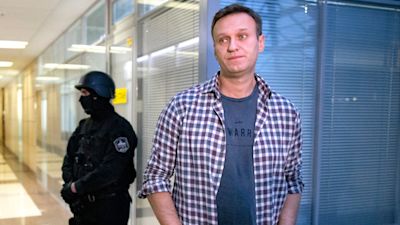Is Russian opposition leader Alexei Navalny on the Kremlin's poison kill list?

Words by ITV News Editor Emma Burrows
Polonium-210, Novichok, nerve-blocking agents.
The poisons supposedly used by the Kremlin to get rid of its opponents are creative and unusual.
The list of alleged Kremlin targets is long and includes opposition figures, journalists and former spies.
Alexei Navalny is Russia's most prominent opposition figure and Kremlin critic.
He became unwell on a plane flying back from Siberia where he had been drumming up grassroots support for opposition candidates ahead of local elections.
His team said they believe a poison was mixed into his tea shortly before the flight.
In a video taken on the plane, a man, said to be Navalny, is heard moaning before another video shows him being hauled off on a stretcher into an ambulance.
For more than a decade, Alexei Navalny has been a thorn in the side of the Kremlin.
He was a key figure in the 2011-2012 protests, leading hundreds of thousands of people into the streets over a freezing Moscow winter to dispute the result of parliamentary elections.
The protests were the biggest in Russia since the fall of the Soviet Union, rocking the Kremlin, and cemented Navalny as Putin's political opponent.
Since then, Navalny and his organisation, the Anti-Corruption Foundation, have made it their business to investigate and expose what they say is high-level corruption among Russian government officials.
In his latest investigation, Navalny targeted Yevgeny Prigozhin.
Prigozhin, known as 'Putin's chef' for his role as the boss of a catering company with government contracts, is also allegedly behind the private military contractor group Wagner, whose personnel have reportedly been spotted during conflicts in eastern Ukraine, Africa and Syria.
Prigozhin has also been sanctioned by the US for allegedly financing a St Petersburg based internet troll factory which pumped out social media posts in an attempt to influence US elections.
“His investigations and political and media activities cause a lot problems for the Kremlin, Kremlin connected people and Putin's close circle of friends,” Pyotr Verzilov, a Russian activist, investigative journalist and friend of Navalny told ITV News.
“It is evident that a poisoning and attack like this is very possible,” he said.
Pyotr Verzilov suggests that his friend Navalny was poisoned
Verzilov himself may know.
The former husband of a member of protest group Pussy Riot, he ran on to the pitch of the Croatia v France match while Russia hosted the World Cup in 2018 to complain about the arrests of people at political rallies.
Shortly afterwards he fell ill losing his eyesight, ability to walk and talk.
He was flown to Germany for medical treatment where doctors said he had symptoms of poisoning.
Verzilov believes that he was attacked by the Russian state security services either for his World Cup pitch invasion or for investigating the disappearance of Russian journalists in the Central African Republic - a place where alleged Prigozhin-linked Wagner mercenaries are also said to be operating.
Prigozhin has previously said the Wagner group does not exist.
The Kremlin has repeatedly been accused of using poison to kill its opponents.
British investigators concluded that Russia was behind the 2006 killing of Alexander Litvinenko, a former intelligence officer, with Polonium-210.
The radioactive poison was supposedly placed in tea which Litvinenko drank before dying six days later, according to a report into his death.
Skripal and his daughter Yulia survived the attack but a local woman who came into contact with the Novichok later died.
Navalny became ill at the same time that the leader of Russia's neighbour Belarus, Alexander Lukashenko, is facing massive protests after allegations of election fraud.
Navalny has criticised Lukashenko, in power for 26 years, and voiced support for Belarusian opposition protesters.
"The Kremlin is extremely worried by what is happening in Belarus," Verzilov said.
"If things change quickly, that means Putin's regime is even less stable."
As the key opposition figure in Russia, Alexei Navalny would be a natural figure to rally around in the event of any challenge to President Putin who has already been in power for more than two decades.
In each case the Kremlin has vigorously denied any involvement in the poisonings, but this has not silenced all its critics.
According to Bill Browder, the man behind the Magnitsky Act which sanctions Russian officials involved in corruption and human rights abuses, what matters for President Putin is deniability.
"Out of one side of his mouth Putin says 'I've done it and if you challenge me politically then terrible things are going to happen.'
"Out of the other side of his mouth he's saying 'I haven't done it, you can't hold me responsible.'
"And that's how Putin operates, It's why he likes poison,” Mr Browder said.
In the case of Navalny, President Putin's spokesperson Dmitry Peskov has said the Kremlin wished him a “quick recovery” but that “suspicions remain just suspicions as to whether it was poison".
Navalny has been attacked before, in 2017 he partially lost the sight in one eye after someone threw a green chemical all over him outside his Moscow headquarters.
Last year he said he had been poisoned while in custody after calling for unauthorised protests.
It is still unclear what, or who, is behind Navalny's latest illness.
What is certain is that the job of Russia's opposition leader is one fraught with risk.